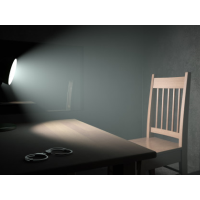After 3 Years, New York’s Promise to Videotape Criminal Interrogations Remains Unfulfilled
 (photo: Mark Evans via Getty Images)
(photo: Mark Evans via Getty Images)
By Jim Dwyer, New York Times
NEW YORK — One morning in September, a line of people turned up at City Hall to speak about a truth that is beyond public dispute: When people are being questioned about possible involvement in crimes, the interrogation should be recorded from start to finish.
Until recently, the custom was for detectives to question a suspect until they had extracted admissions of guilt, and only then turn on the cameras.
Afterward, everyone would go to court and argue about what happened before the camera went on. Now, 22 states and the District of Columbia require that the entire interrogation be recorded.
Not New York, however, one of the capitals of progressive America. Also, of wrongful convictions: In just the last decade, the city and state have paid out tens of millions of dollars to innocent people sent to prison, a startling number of them because of false confessions.
A police commissioner promised in September 2013 — three years ago — that city detectives were ready to begin taping interrogations in the most serious crimes. In testimony before the City Council in September of this year, the city’s chief of detectives wholeheartedly endorsed the idea of recording the whole process, and he said that it was already city policy.
Those are promises, not law. It is a simple matter to see the gulf between a policy announced and the way things actually work.
Since October, a man named Pedro Hernandez has been on trial in Manhattan Supreme Court in the murder of Etan Patz, a child who disappeared decades ago as he walked from his home in SoHo to a bus stop. The only evidence against Hernandez is his own words. Four years ago, when he was living in New Jersey, Hernandez was questioned for hours in a room equipped with recording gear that was not turned on until he began incriminating himself.
With no physical evidence, the trustworthiness of Hernandez’s confession is really the only question in his trial.
Another case, in preliminary stages in Queens, involves the interrogation in February 2015 of a man named Alexander Bonich for many, many hours — 18, his lawyer says — before authorities were satisfied that he was prepared to incriminate himself in front of a video camera.
Bonich is accused of killing a man he had befriended, a scholar of Croatian history who had recently come to New York. The defense lawyer, Spiro Ferris, is arguing that Bonich’s “will was overborne” during the hours of unrecorded interrogation.
Just as with Hernandez, maybe Bonich gave a true confession. Maybe he did not.
Without recordings of the interrogations, hearings on disputed confessions drag on for days, wasting time and money.
Recording interrogations is a way to know whether law enforcement — and jurors — can be confident in the confessions that result.
When innocent people confess, dangerous criminals are free to continue their violence. After five teenagers were charged with the assault on a jogger in Central Park in April 1989, the real attacker rampaged through the Upper East Side for months, raping at least four other women, killing one of them, before being caught by a building porter with a broomstick.
Nationally, false confessions were made by nearly 30 percent of all the people who have been exonerated through DNA testing. In New York state, the percentage is even higher: Of 29 people cleared by DNA, 14 had falsely confessed. With the cameras rolling, almost every one of those 14 innocent people managed to provide details known only to the real culprits. In a case that reached the state’s highest court, the judges came to the common sense conclusion that the detectives had fed those details to the person being questioned, either accidentally or otherwise.
City officials say that 5,000 interrogations have been recorded, and that every detective bureau now has the equipment. But at City Hall that afternoon in September, two judges, Mark Dwyer and Daniel Conviser, testified that they had seen few cases in which the interrogations — as opposed to the confessions — were recorded.
“One can speculate that some old-fashioned detectives may not want to have their methods on video as it might embarrass them,” said Dwyer, a former prosecutor.
The chief of detectives, Robert Boyce, sent his testimony and did not personally appear in front of the council to discuss the recording he endorsed.
Too bad: He missed a reality check.
Just as the pope in Rome can issue edicts, so, too, can bosses in Police Headquarters. No matter how earnest they are, it is still a long road to the parishes and precincts where faith and justice are retail operations.
To Learn More:
7,000 People Covertly Swept Up Into Secret Chicago Police Interrogation Center (by Noel Brinkerhoff and Steve Straehley, AllGov)
Civil Liberty Violations Seen in Police Interrogations of Demonstrators (by Noel Brinkerhoff, AllGov)
FBI Reverses Century-Old Policy, Will begin Recording Interrogations (by Noel Brinkerhoff, AllGov)
Supreme Court Rules a Suspect’s Silence during Police Interrogation Can be Used against Him (by Noel Brinkerhoff and Danny Biederman, AllGov)
- Top Stories
- Unusual News
- Where is the Money Going?
- Controversies
- U.S. and the World
- Appointments and Resignations
- Latest News
- Musk and Trump Fire Members of Congress
- Trump Calls for Violent Street Demonstrations Against Himself
- Trump Changes Name of Republican Party
- The 2024 Election By the Numbers
- Bashar al-Assad—The Fall of a Rabid AntiSemite






Comments